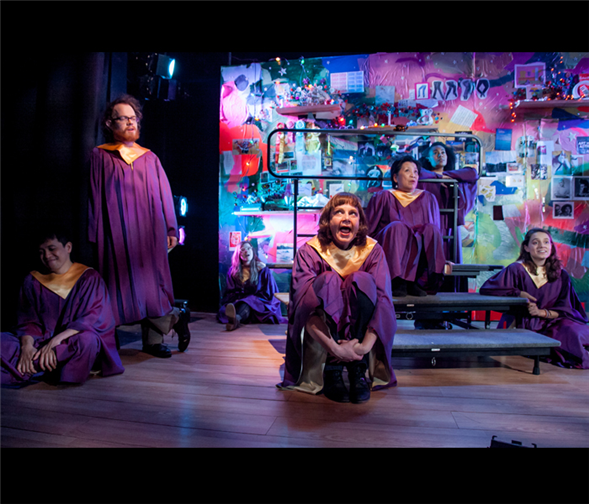Translate Page

Clare Barron puts her adolescent turmoil on stage
---
A few years ago, Clare Barron had an immediate deadline after completing her Obie-award winning play You Got Older, and in order to avoid starting from square one, she wanted to work with existing text. She was also interested in exploring adolescence, and soon enough she realized she had the perfect source material to address both needs: her real-life teenage diary. The resulting play, I'll Never Love Again (a chamber piece), runs through Mar. 19 at the Bushwick Starr.
"I feel like my experience as a teenager doesn't line up with how teens live in the media," Barron says, describing her strong female friendships and abstinence from drinking, drugs, and sex. "I was way weirder and nerdier and very sensitive emotionally. I've always felt left out by those teen movies, as much as I love them."
Coupled with this sentiment was her fascination with how teens tend to get cast on New York stages. Barron, who has been asked to play a number of adolescents, wonders why a petite frame and elfin looks are often equated with being a high school student. "Why is that coded for teenager?" she asks. "It's a total fabrication—that was part of my impulse for my diary text to be a whole choir of people."
An 11-person choir, portrayed by actors of all ages and stripes, performs the role of "Clare." They speak and sing fragments from her diary while describing the rise and fall of her first relationship. Some songs are choral standards, but original music – composed by Stephanie Johnstone – also tumbles out. No matter what they're singing, the choir is Clare's consciousness, and the details they divulge about kissing, courtship, and breaking up are both familiarly funny and painfully true.
And though many of the emotions scrawled across the pages of the diary might seem outsized to an adult brain, Barron is committed to making them resonate with a grown-up audience.
In one section, for instance, an adult Barron portrays a younger version of herself in an act of sexual intimacy with real-life long-time friend (and object of her 8th grade crush) Paul Cameron Hardy. As the two go at each other between bits of banter, Barron laugh-tremble-cries in a coming-of-age portrait that arguably captures every shade of adolescent complexity.
Meanwhile, the choir's soaring voices add heft to distraught lines like "I'm dying," "Let life not be like this," and "I'm puking up a shredded heart."
Barron says, "I didn't want to make fun of the language. The pain was so real, so music becomes the container for this emotion."
Crucially, the second half of the play shifts to a contemporary office space, where music is replaced by the sound of printers printing and people eating corn chips. "I want there to be pockets of time for the audience to think," Barron says. "I edited and collaged the material in a way that I hope helps the audience's experience not be one of distance. I want it to open up remembering, and I hope it serves as a memory machine."
---
Eliza Bent is a writer and performer based in Brooklyn.
Photos by Eric Carter. To photo: The choir performs as "Clare."
TDF Members: Click here to browse our discounts for theatre, dance, and concerts.